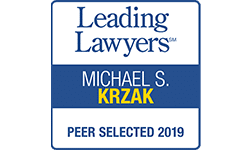Illinois Workers’ Compensation Commission Announces “Emergency” Amendment

The Illinois Workers’ Compensation Commission has announced an “emergency” amendment under The Rules of Evidence — Section 9030.70(a). Under the “emergency” amendment a rebuttable presumption has been created for “first responders” and “front-line workers” who are diagnosed with COVID-19 during a COVID-19-related state of emergency.
The rebuttable presumptions include: (a) the exposure will be presumed to have arisen out of and in the course of the COVID-19 First Responder or Front-Line worker’s employment and that (b) the exposure will be presumed to be causally connected to the hazards or exposures of COVID-19 First Responder or Front-Line Worker’s employment.
Impact of the Rule
Normally, the employee has the burden to prove the elements of their claims by a preponderance of the evidence. This rule appears to shift the burden of proof to the employer to prove that the “first responder” or “front-line worker” who contracts COVID-19 contracted it outside of the workplace.
Who Are Considered “First Responders” and “Front Line Workers”?
The “emergency” amendment defines “COVID-19 “first Responder” or “front-line workers” as:
Any individuals employed as
- Police;
- Fire personnel;
- Emergency medical technicians or paramedics; and
- All individuals employed and considered as first responders, health care providers, engaged in patient care, correction officers, and the crucial personnel identified under the following headings in Section 1, Part 12 of Executive Order 2020-10 dated March 20, 2020, including:
- “Stores that sell groceries, and medicine”;
- “Food, beverage, and cannabis series”;
- “Gas stations and businesses needed for transportation”;
- “Financial institutions”;
- “Hardware and supplies stores”;
- “Critical trades”;
- “Mail, post, shipping, logistics, delivery and pick-up services”;
- “Educational institutions”;
- “Laundry services”;
- “Restaurants for consumption off-premises”;
- “Suppliers to work from home”;
- “Supplies for Essential Businesses and Operations”;
- “Transporation”;
- “Home-based care and services”;
- “Residential facilities and shelters”;
- “Professional services”;
- Day care centers for employees exempted by [Executive Order 2020-10]”;
- “Manufacture, distribution and supply chains for critical products and industries”;
- “Critical labor union functions”;
- “Hotels and motels”; and
- “Funeral services”.
A large number of potential Illinois employees appear to be the subject of this “emergency” Amendment. The “emergency” order suggests hat the commission will be inclined to accept these exposure claims brought by “first responders” and “front line workers” unless the employer can rebut the presumption through evidence that the employee contracted COVID-19 outside of their employment.
What Benefits Could Be Received by Employees Covered by the “Emergency” Amendment
“First Responders” and “Front Line Workers” who are covered by the “emergency” amendment would be entitled to the benefits that are available under the Occupations Diseases Act and the Workers Compensation Act. Under those acts, the employer has the obligation in compensable cases to:
- Pay 100% of medical bills, meaning there are no co-pays or deductibles;
- Pay temporary total disability (ie. 2/3 of the employees salary while the employee is unable to work as a result of COVID, calculated per the average weekly wage under the Acts; and
- Pay permanent partial disability (ie. damages if there is a permanent injury such as lung damage or other long-term disability resulting from the individual contracting COVID-19)
Additionally, in extraordinary cases resulting in the death of the “first responder” and “front line workers” who contracted COVID-19 in the course of their employment, death benefits under the Occupational Diseases Act and Workers Compensation Act may be available.
Steps to Be Taken in Considering Whether a Claim Should Be Brought
In order to bring a claim under the “emergency” amendment, it appears that the diagnosis of COVID-19 must first be confirmed, so testing will be necessary. Absent a confirmed diagnosis, it does not appear that the “emergency” amendment will apply. Other things to consider in determining whether the employer will be able to rebut the presumption include: (a) have other employees in the department or facility been diagnosed with COVID-19, and if so, how many; (b) has the employee been in contact with other individuals outside of work (ie. family members) who have been diagnosed with COVID-19; (c) has the employee practiced social distancing and other protective measures recommended by the CDC outside of work hours.








